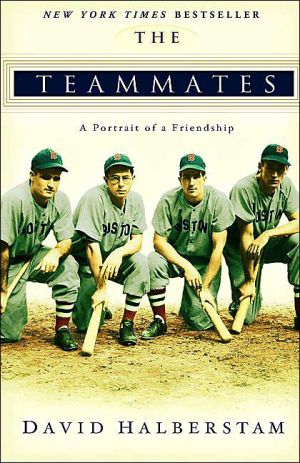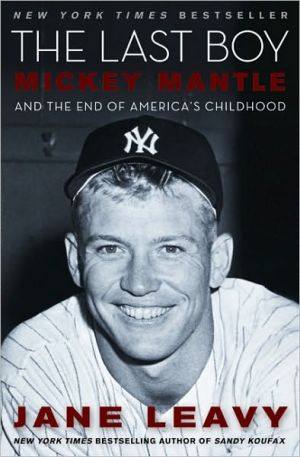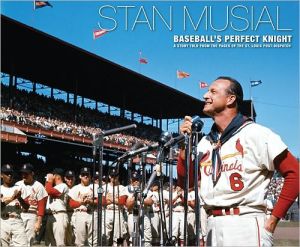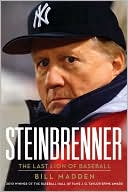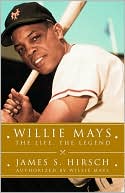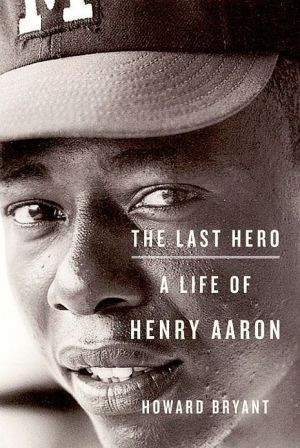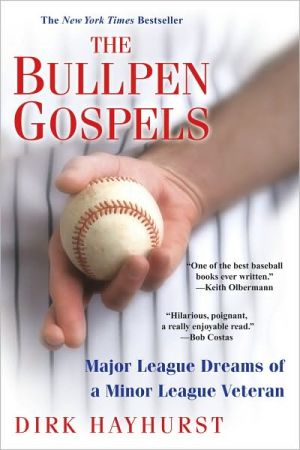The Teammates: A Portrait of a Friendship
"In early October 2001, Dominic DiMaggio and Johnny Pesky begin a 1,300-mile trip by car to visit their beloved teammate Ted Williams, knowing that he is dying. Bobby Doerr, the fourth member of this close group - "my guys," Williams used to call them - is unable to be with them because he is back in Oregon tending to his wife of sixty-three years, Monica, who has suffered her second stroke." "At the core of the book is the friendship of these four very different but extraordinary men, the...
Search in google:
Halberstam frequently interviewed Ted Williams, Bobby Doerr, Dom DiMaggio, and Johnny Peske. In this book, Halberstam offers a rare glimpse into the special lives and friendships of these men. But it focuses on the more than 50-year friendship among them and serves as a testament to loyalty and the bonds of friendship. An elegant account of the lives and friendships of four legendary Boston Red Sox.
The Teammates\ \ By David Halberstam \ Hyperion Books\ Copyright © 2003 David Halberstam\ All right reserved.\ ISBN: 140130057X \ \ \ \ Chapter One\ Ted was dying, and the idea for the final trip, driving down to Florida to see him one last time, was Dominic's. It was in early October 2001, and Dominic was not eager to get aboard a plane and fly to Florida so soon after the September 11 terrorist attack, and his wife, Emily, most decidedly did not like the idea of him driving there all by himself. "I just don't want you driving to Florida alone," she told him. "It's much too far." They had been having dinner at a restaurant in Marion, Massachusetts, with their friend Dick Flavin, a local television personality and humorist. Flavin's boyhood hero, a mere 55 years earlier, had been this same Dominic DiMaggio, then the centerfielder for the Red Sox. Half to herself Emily had added, "Can you imagine? An eighty-four-year-old man driving all the way to Florida by himself." It was said in a way that precluded any argument. "How about this?" Flavin suggested to Dom. "I'll go with you and share the driving." Dominic jumped at the offer and immediately signed on. That gained Emily DiMaggio's approval, something not lightly done. "I know what else, I'll call John," Dominic added, "and see if he'll come with us" John was Johnny Pesky, his and Ted's teammate for all those years, for whom trips to Florida were significantly harder to make.\ Pesky loved the idea and he too quickly signed on, and in the way that these things are decided without being formally decided, it was agreed that Dominic and Dick would share the driving and John, 82, would sit in the backseat. As a kind of penance, Pesky agreed not to smoke his requisite two cigars a day. Bobby Doerr, the fourth teammate who had remained so close with the others, would not be able to make the trip. He lived injunction City, Oregon, and though he made occasional trips back East, usually to the annual Hall of Fame induction ceremony in Cooperstown, New York, his ability to travel had been severely limited after Monica, his wife of 63 years, had suffered two strokes in 1999.\ They had, the four of them - Ted Williams, Dom DiMaggio, Bobby Doerr, and Johnny Pesky - played together on the Red Sox teams of the 1940s; Williams and Doerr went back even further: They were teenagers together on the San Diego Padres, a minor league team in the mid-'30s, and played with Boston in the late '30s. All four were men of a certain generation, born right at the end of World War One within 31 months of each other - DiMaggio in 1917, Doerr and Williams in 1918, and Pesky in 1919. Doerr's middle name, in fact, was Pershing, after John "Black Jack" Pershing, the American general who had led the American troops in Europe in the Great War. On occasion, Doerr had been called Pershing by his teammates in the old days.\ They were all four from the West Coast, and three of them, Doerr, DiMaggio, and Williams, started out in the Pacific Coast League, then a top minor league. The other three had encountered Pesky first not as a peer, an up-and-coming young short-stop with uncommon bat control who could hit to all fields, but instead as the boyish clubhouse attendant who worked in the locker room for the Portland Beavers in the PCL. It had been Johnny's job to wash the athletic clothing and shine the shoes of the visiting players, and the players tipped him 25 or 50 cents a game for the service. When Pesky was about to join the big club in Boston in 1942, after leading the American Association in hits in Louisville, the other three, all big leaguers by then, had joked about him: Yes, it was the same Johnny Pesky, you know the little guy who shined our shoes and washed our jocks back in Portland. Needle Nose, they eventually nicknamed him, because of his prominent nose. No one had liked using the name more than Ted, who seemed to think it made Pesky into the younger brother he had always wanted (instead of the younger brother he actually did have, Danny Williams, who was constantly in trouble with the law and thus a reminder to Ted of the fragility of his own hard-won position in life). Pesky's nose was indeed rather long and sharp, especially in relation to his body, which was rather small. The nickname might not have lasted a lifetime, had it not been for Ted, who used it so much that on occasion, when John called the others, he would identify himself simply by saying, "This is Needle."\ They were all special men - smart, purposeful, hardworking - and they had seized on baseball as their one chance to get ahead in America. They had done exceptionally well in their chosen field. Williams and Doerr were in the Hall of Fame. Many of the players from that era were puzzled that DiMaggio and Pesky had not been eventually inducted by the old-timer's committee, which took a belated second look at who had made the Hall and who had not. That was particularly true in the case of Dominic DiMaggio, who had been an All Star seven times; Williams himself believed that it was a travesty that Dominic was not in the Hall. None of the four, most assuredly, had gotten rich off the game, not in the era they played in and not in the material sense, for the richness they had taken from the game was more subtle and complicated. A couple years ago Pesky and DiMaggio were together at the funeral of Elizabeth "Lib" Dooley, a beloved Red Sox rooter who was considered the team's foremost fan, having attended every home game from 1944 to 1999, and John had casually asked Dominic how much he had made in his best years. Forty thousand, Dominic answered, and then he asked John the same question. Twenty-two five, Pesky said.\ They had after all grown up in a much poorer America when career expectations were considerably lower, when the people who went off to college were generally the people whose parents had gone off to college before them. Two of the four, DiMaggio and Pesky, were the children of immigrants. In DiMaggio's home, Italian was still spoken, and Pesky's real family name was Paveskovich, as his Croatian parents were still known, at least to themselves if not to the larger world. Williams had grown up in what was ostensibly a traditional Scotch-Irish home - what name could be more American than Williams? - but in fact his mother, unbeknownst to most of Ted's friends, was half Mexican.\ That was the America that existed before the coming of the G.I. Bill and the postwar meritocracy, Which made it possible, seemingly overnight, for all kinds of bright, young Americans, who would never before have had the opportunity, to go to college. Dominic DiMaggio, it was true, had an offer of a college education - he had always done well academically - but he went to work instead. In the case of the other three, the one great chance to get ahead had come through baseball. Looking back through the lens of today's infinitely more affluent America, it seems hard to believe that their choices were so limited. Today it might have been quite different for them: Ted Williams, with his passion for excellence, his outrageous, almost belligerent intelligence, and the sheer force of his unyielding personality, might have become a brilliant brain surgeon; Dom DiMaggio might have ended up as the CEO of a major corporation; Bobby Doerr might have gone to a small college - he is a quiet man, and a big university would have been an uncomfortable experience for him - and stayed on to become, almost to his surprise, the dean, popular with both students and faculty; and Pesky might have become the baseball coach at a large university, where his teams always won, and where in time he was regarded as a legend.\ \ \ \ \ Excerpted from The Teammates by David Halberstam Copyright © 2003 by David Halberstam\ Excerpted by permission. All rights reserved. No part of this excerpt may be reproduced or reprinted without permission in writing from the publisher. \ \
\ TimeHalberstam has given [Williams, Pesky, DiMaggio, and Doerr] a glorious, flaming autumnal epilogue.\ \ \ \ \ The New York TimesAs David Halberstam sketches their lives, The Teammates even bears a resemblance at times to Graham Swift's novel Last Orders (1996), in which a carload of mourners travels from London to Kent, reminiscing about themselves and a departed friend. In this case Williams was still alive, but frail and in a wheelchair -- a 130-pound wraith of his former self -- and the journey took on a certain urgency and poignance. — Charles McGrath\ \ \ The Washington PostThis slender, elegant book follows DiMaggio and Pesky -- Doerr was tending to his sick wife back home in Oregon -- on their drive from Massachusetts to Florida to visit the ailing Williams. The drive is just the narrative thread; most of the book centers on the lives of these four men, whom Halberstam got to know while researching The Summer of '49. — Jonathan Mahler\ \ \ \ \ From The CriticsAn elegant account of the lives and friendships of four legendary Boston Red Sox.\ \ \ \ \ Publishers WeeklyFamed journalist and baseball aficionado Halberstam (Summer of '49) presents a short but sweet account of the lives and friendship of four ballplayers from the legendary Boston Red Sox teams of the 1940s: Ted Williams, Dominic DiMaggio, Johnny Pesky and Bobby Doerr. Told in a series of flashbacks as DiMaggio and Pesky drive from Massachusetts to Florida to see an ailing Williams for what was probably their last time, Halberstam's story is less a biography and more a reverie for "men of a certain generation, born right at the end of World War I" who "had seized on baseball as their one chance to get ahead in America." The book tells the various ways each player "shared an era," from their childhoods to their first meetings through their long tenures with the Red Sox. As in his other sports books, Halberstam has a great eye for the telling detail behind an athlete's facade, whether it is Williams's sense of himself as "a scared, unwanted, unloved kid from a miserable home" or Pesky's stoic acceptance of being blamed for the Red Sox's loss in the seventh game of the 1946 World Series, when in fact-as Halberstam clearly shows-it was not Pesky's fault at all. Fans of Halberstam's work will be satisfied by his chapter-long description of that crucial World Series game. But that is merely the more obviously exciting part of a book in which the main pleasures are more quiet glimpses of the four friends, including Doerr's calming influence over the more explosive Williams, DiMaggio's heroic fight against Paget's disease and the friends' final, touching meeting with Williams in Florida. Copyright 2003 Reed Business Information.\ \ \ \ \ From The Critics"This account of good people living full lives . . . will move people the same way that Tuesdays with Morrie did." (Booklist)\ \ \ \ \ Library JournalPulitzer Prize-winning historian and devoted baseball fan Halberstam offers a poignant and elegiac valentine to baseball nostalgia, the magic of lifelong friendship, and the genius of the mercurial Ted Williams. As Williams lay dying in 2001, Dom DiMaggio and Johnny Pesky, his dear friends and old Boston Red Sox teammates from the 1940s, drove from Massachusetts to Florida to see him one last time. The fourth teammate, Hall of Famer Bobby Doerr, was unable to join the others as he was caring for his wife who had just suffered a stroke. The physical journey down the eastern seaboard is juxtaposed with the sentimental odyssey through the decades of each man, including the absent Doerr, and their abiding and loving relationships with one another. The resulting portrait of the decidedly complex and brilliantly gifted Williams along with a bountiful cornucopia of baseball memories, hitting secrets, World Series stories, locker room anecdotes, and strong bonds engendered throughout the years is absolutely enchanting. Tate Donovan's beautifully sonorous voice keeps a firm and steady hold on the narrative reins. A lovely story celebrating baseball, friendship, life and death, and Ted Williams, made into an absorbing audiobook. For all collections.-Barry X. Miller, Austin P.L., TX Copyright 2004 Reed Business Information.\ \ \ \ \ Kirkus ReviewsAffectionate, informed, and smooth-as-cream portrait of four Boston Red Sox greats and their abiding friendship over many years. Even back then, it was "something unusual for baseball: four men who played for one team, who became good friends, and remained friends for the rest of their lives." Now, writes Halberstam (Firehouse, 2002, etc.), with free agency creating volatility in the rosters and salaries serving to lessen the connection between teammates, this story of Ted Williams, Dom DiMaggio, Bobby Doerr, and Johnny Pesky is especially poignant. All four were Bosox stars in the 1940s and Halberstam re-creates many of the great moments of that decade, though perhaps even more enjoyable here are the sweet nuggets and inside observations of the men--of Pesky taking the fall for a bad play by Leon Culberson that lost the 1946 World Series because of the code mandating one player never point a finger at another, and reminiscing of Yankee pitcher Spud Chandler, "God, he was mean. He'd hit you in the ass, just for the sheer pleasure of it," and tuning in to excerpts from the Ted Williams Lecture Series. As ever, Halberstam, always a welcome sportswriter, finely delineates the personalities: Doerr's preternatural emotional equilibrium, the guileless Pesky, Williams’s contentiousness, animal energy, and generosity. He also provides enough family history to give a sense of how extraordinary it was these four men came to be such great players, and how each in turn readily acknowledged their great good fortune at having been able to be part of the game at all. And the story lightly revolves around a car trip by Pesky, DiMaggio, and humorist Dick Flavin for a last visit with the rapidly dwindlingWilliams, highlighting the fact that all of the men may soon be gone and with them a classy style of play no longer in evidence. A string of pearly anecdotes that reverberate far beyond the diamond.\ \
